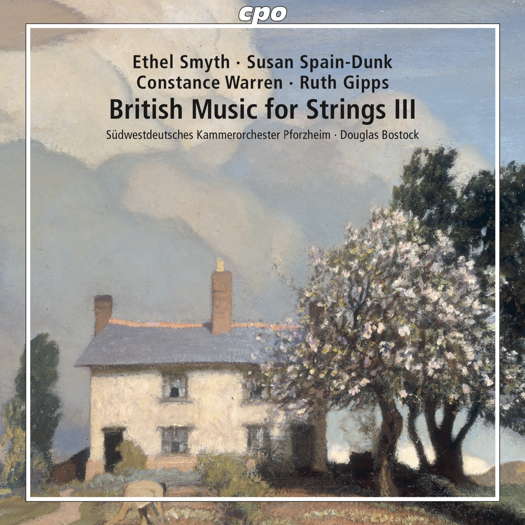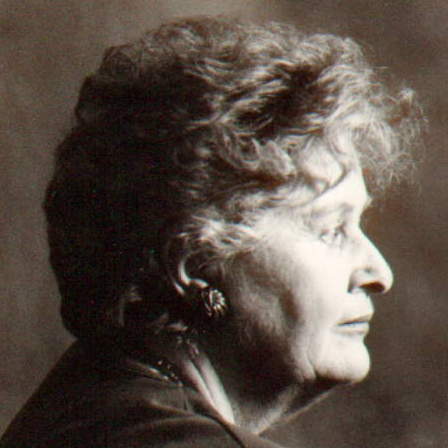 FEEDBACK: She said WHAT? Read what people think about our Classical Music Daily features, and have your say!
FEEDBACK: She said WHAT? Read what people think about our Classical Music Daily features, and have your say!

Important Women Composers
British music by Ethel Smyth, Susan Spain-Dunk, Constance Warren and Ruth Gipps, heard by GERALD FENECH
'... performances of the highest calibre, combining irrepressible beauty and fragility with technical mastery that brings out all the suavity of these sophisticated creations.'
This third volume in CPO's ongoing series dedicated to British String Music features works by four important women composers. Some of them were initially under-appreciated and their music was only later performed again and received proper recognition. However, the period from 1893 to 1934 was still an extremely favourable time for British women composers who wanted to present their works on their country's concert stages, in as much as they could count on the support principally of Sir Henry Wood at the Proms and Dan Godfrey in Bournemouth. Ethel Smyth and Susan Spain-Dunk were two beneficiaries of this support.
Ethel Smyth was born in London on 22 April 1858, and was the fourth child of a family of eight. Her father J H Smyth, who was a Major-General in the Royal Artillery, was very much opposed to her making a career in music, but Ethel was determined on her ambition to be a composer, and she started her studies with a private tutor. Later she attended the Leipzig Conservatory, where she met many composers of the day. Her output is pretty substantial and includes songs, piano pieces, chamber and orchestral music, concertante works, choral works and operas. She lived in Frimhurst for many years, but from 1913 onwards she began to gradually lose her hearing and managed to complete only four major works before deafness brought her composing career to an end. However, she found a new interest in literature and, between 1919 and 1940, she published ten highly successful, mostly autobiographical books. In recognition of her work as a composer and writer Smyth was made a Dame Commander of the British Empire in 1922. She died in Woking on 8 May 1944 and is buried there. Music and literature apart, Smyth has remained famous for her fight for women's rights as a member of the women's suffrage movement, which was instrumental in winning the right for women to vote among other things.
Published in 1891, the Suite for Strings, Op 1A, is not an original work but a rearrangement from the String Quintet in E, Op 1, composed some ten years earlier. The piece is in five movements, and at nearly thirty minutes it is the longest composition on this programme. It is an early work, but nonetheless, the music flows effortlessly and is permeated by moments of joy and tenderness. Notwithstanding, careful listening does reveal an underlying energy that was to be the hallmark of Smyth's later symphonic repertoire.
Listen — Ethel Smyth: Allegro con brio (Suite for Strings, Op 1A)
(555 457-2 track 1, 0:00-1:00) ℗ 2021 Classic Produktion Osnabrück :
Susan Spain-Dunk was born in Folkestone on 22 February 1880 and was the third of four children. Their father was a house builder, and her second name, Spain, was added as the Dunk family were related to the Spain family. Susan studied violin and composition at the Royal Academy of Music, and later taught composition and harmony. For a time she played the viola in a private quartet of Walter Cobbett, and also formed part of the Winifred Small Quartet, playing both the violin and the viola. As her career progressed she started to conduct some of her own compositions with the British Women's Symphony Orchestra at the London Promenade Concerts (1924-27) and also in Bournemouth, Eastbourne and Torquay. In 1908 she married Henry Gibson, a minor composer, violinist, organist and pianist. The marriage lasted sixteen years and she had one son and two grandchildren. Spain-Dunk died on 1 January 1962, aged sixty-one, leaving behind a considerable corpus of works that are mainly orchestral and chamber pieces.
The Suite for String Orchestra in B minor was composed when Spain-Dunk was thirty years old. Despite being one of the very first pieces to be written, the suite is very compact and rich in musical ideas, and its compositional structure is that of a mature composer. Indeed, Sir Henry Wood thought very highly of it, and he premiered the piece at the Proms on 21 August 1924.
Listen — Susan Spain-Dunk: Scherzo (Suite in B minor)
(555 457-2 track 9, 0:00-0:49) ℗ 2021 Classic Produktion Osnabrück :
The 'Lament' for String Orchestra also dates from 1920, and despite its brevity, the work is a powerful expression of an unconsoled heart that cannot come to terms with a tragic loss of some kind.
Listen — Susan Spain-Dunk: Lament
(555 457-2 track 12, 0:00-0:52) ℗ 2021 Classic Produktion Osnabrück :
Constance Warren (1905-1984) was a composer and piano teacher. She taught at the Birmingham School of Music and Birmingham Conservatoire, and among her many pupils one could find such names as Brian Ferneyhough and Malcolm Wilson. Heather Hill for String Orchestra (1929-32) is a miniature gem in which Warren displays her gift for colour with some exquisite deft touches of her orchestral brush. Indeed, this short piece has all the descriptive qualities of a quiet spot in the countryside, where peace and serenity merge to form an idyllic aura of contemplative beauty.
Listen — Constance Warren: Heather Hill
(555 457-2 track 11, 1:02-1:48) ℗ 2021 Classic Produktion Osnabrück :
Ruth Gipps (1921-1999) was a child prodigy composer, oboist and pianist. After a hugely successful beginning, where she won several performance competitions and had her compositions published, in 1937 she furthered her studies at the Royal College of Music, where at one point, she was taught composition by none other than Vaughan Williams. Gipps continued her studies at Durham University and her career was moving on very nicely, especially as an oboe and piano soloist. Aged thirty-three though, she had to face the misfortune of a hand injury, meaning she could no longer perform. From then on she concentrated more on composing and conducting, although she had little success finding a good position in the latter role, due to discrimination against female conductors. Indeed, how times have changed. Later roles included faculty posts at Trinity College, London, Royal College of Music and Kingston University. Gipps was also responsible for founding the London Repertoire Orchestra in 1955 with the aim of giving young professional musicians more public and musical exposure. In 1961 she also set up the Chanticleer Orchestra, which focused mainly on premieres by living composers. At the time of her demise on 23 February 1999 she was one of the most prolific composers in Britain, having written five symphonies, seven concertos and numerous chamber and choral works.
Cringlemire Garden for String Orchestra, Op 39, which dates from 1952, is a fragile and evocative piece that captures all of the scented sounds of the lush English countryside with natural instinctiveness.
Listen — Ruth Gipps: Cringlemire Garden
(555 457-2 track 13, 0:20-1:13) ℗ 2021 Classic Produktion Osnabrück :
The Warren and Gipps pieces are world premiere recordings and both were edited by Douglas Bostock, whose utter dedication for this cycle draws once more performances of the highest calibre, combining irrepressible beauty and fragility with technical mastery that brings out all the suavity of these sophisticated creations. This is soothing string music in enviable sound quality and with informative annotations.
Copyright © 13 March 2022
Gerald Fenech,
Gzira, Malta

CD INFORMATION: BRITISH MUSIC FOR STRINGS III



